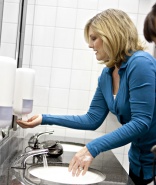Home › magazine › european reports › Focus on hygiene return to the workplace
Focus on hygiene - return to the workplace
24th of September 2021As people all over Europe return to work following lockdowns, Anna Konigson Koopmans from Tork manufacturer Essity looks at how managers can address their employees’ cleaning and hygiene concerns when they re-enter the workplace.
People are returning to work. Some are delighted to be back, others somewhat less so.
A recent UK study carried out by Deloitte revealed that 28 per cent of workers are desperate to return to the office and hope never again to have to transform their spare bedroom into an office. On the other hand, almost a quarter of respondents expressed a strong preference for continuing to work from home. And 42 per cent said they would like a balance between the two, with a maximum of three days spent working at the office every week.
But the final decision will be largely up to employers, many of whom will prefer their staff to be on site where they can be seen and are directly accountable. And office-based working has other advantages such a sense of team spirit and the ability to exchange ideas on a casual basis and arrange ad hoc meetings.
However in the age of a global pandemic, the downsides of congregating in an office are all too clear. Many workplaces today are open-plan facilities where people sit closely together at adjoining desks. They also tend to be poorly ventilated places where air conditioning systems are more prevalent than open windows. And while these environments may be highly suitable for collaboration and co-working, they have clear pitfalls in an age when social distancing is necessary and where high levels of hygiene are crucial.
The typical office building also contains plenty of shared spaces such as meeting rooms, break-out rooms, kitchens and washrooms – all of which are potential sources of cross-contamination and virus transmission. And the washroom in particular is a matter of ongoing a concern for many office workers.
In a global study carried out by Essity in 2016 it emerged that 42 per cent of respondents were hesitant about using the toilets at work. Around 40 per cent of the 8,000 people questioned said their workplace washrooms were often inadequately cleaned or would frequently run out of soap and paper. And 12 per cent said they rarely or never used the office toilets at all, with this figure rising to 56 per cent when the facilities were actually perceived to be unclean.
Refraining from using the washroom is a bad idea for many reasons. Such a practice could lead to poor concentration, discomfort and health issues on the part of staff, for example. And during a global pandemic there are further concerns since the washroom is the place where most people go to wash their hands.
We at Essity recently polled the opinions of more than 15,000 respondents in 15 countries to discover people’s attitudes to cleaning and hygiene when returning to work after Covid-19 lockdowns. The Essity Essentials Initiative Survey looked at changing perceptions of hygiene and health as a result of the pandemic. According to the results, three out of four respondents now expect their employers to provide extra cleaning rounds to help counteract Covid-19.
Attention to hygiene
At the same time, more people are paying closer attention to their own personal hygiene than they used to do and are washing their hands an average of 10 times per day compared with eight times before the pandemic. And 62 per cent are doing so for 20 seconds or more according to WHO’s recommendations.
But despite the fact that Covid-19 can be spread via frequently-touched surfaces, 27 per cent of survey respondents said they did not routinely wash their hands after touching shared devices such as tablets and smartphones. And 21 per cent regularly failed to carry out a hand wash after shaking hands with other people while 17 per cent neglected their hand hygiene after coughing or sneezing.
So while staff members have higher expectations of their office managers and cleaning staff, it is clear that more needs to be done to communicate the hand hygiene message and to encourage the use of the washrooms where hand washing may be carried out.
Workplace washrooms should be pleasant, efficiently-run spaces where people will feel safe during the current health situation. It can be disconcerting to walk into a small washroom facility and be confronted by several other people in the same cramped space. So a one-in, one-out washroom policy would help everyone to feel more secure.
If the outer door to the washroom is left open at all times it is easier to tell at a glance whether anyone else is inside. Where this is not practicable, a vacant/occupied sign should be placed on the outer door.
Efforts should be made to speed up washroom use to allow for a quicker throughput. One way of doing this is to remove the mirrors from the washroom space. A separate “wash and brush up” room could be provided outside the washroom instead, or mirrors could be put up on the walls around the office. This would allow people to quickly check their appearance as they went about their work.
Speed up visits
While hand hygiene protocols should never be skimped, washroom use can still be sped up if all washing and drying facilities are quick and easy to use. Soap dispensers that require a low push force and hand towel units that provide a seamless delivery will facilitate a faster throughput than badly-functioning soap dispensers and air dryers that take 10 seconds or more to dry the hands.
Disposable towels have become generally more popular during the global pandemic for their speed of delivery and for other reasons. According to our Essity Essentials Initiative Survey, 64 per cent of people will routinely walk away from the air dryer before their hands are completely dry in order to save time. This is highly unsatisfactory because the washroom user will have wasted valuable seconds – and their hands will still be damp.
A hand towel dispenser placed above the sink and a bin placed by the exit will allow people to take a towel and dry their hands as they go.
Covid-19 has made all of us more nervous about touching washroom surfaces and this has led to an increased use of touch-free taps, flush systems and dispensers. It has also made people more reluctant to touch cubicle door handles and outer door panels.
Avoid touching
A total of 73 per cent of people questioned in our study said they were now routinely using a paper hand towel to avoid touching washroom surfaces such as door handles and taps. A mini hand towel dispenser placed by the outer door will therefore facilitate this practice and encourage people to use a towel as a barrier when using the door handle.
There are other ways in which operatives can be made to feel safe when returning to the workplace. For example, positive messaging will help to provide a reassuring environment for nervous returners. Signs reminding people to wash their hands plus details of daily cleaning schedules will help to instil confidence that high cleaning and hygiene standards are being met. And these cleaning schedules should also include contact numbers to allow people to report any run-outs or other hygiene issues.
Another finding of our study was that one in five people now use hand sanitiser as their main method of hand hygiene. While washing the hands with soap and water is the best method of removing any dirt or soiling, it makes sense to provide sanitiser dispensers throughout the office to ensure that everyone receives some level of protection whether they visit the washrooms or not.
Stress levels will be high for those who are nervous about sharing communal office spaces once again. For this reason, Essity has launched the Tork Office Hygiene Package which comprises a breakdown of suggested products, services, tools and protocols to help workplaces meet the requirements of the new hygiene standard.
Returning to work will not be easy for some. But even the most hesitant of staff members will be reassured with the aid of clear instructions, bespoke tools, user-friendly systems and well-thought out strategies.












